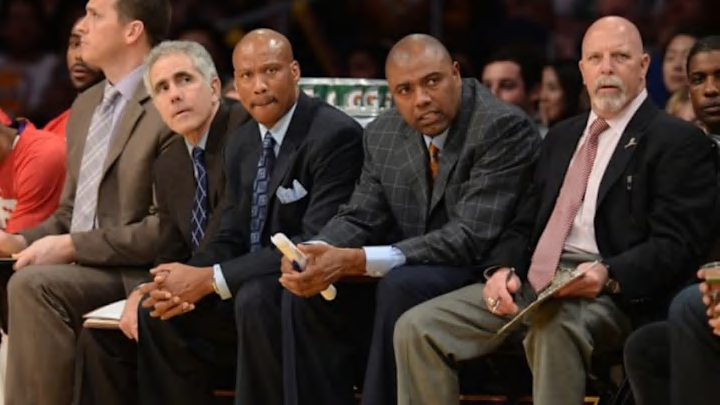
Perhaps in response to the perception that the organization had fallen behind the times, this offseason the Los Angeles Lakers have publicized their previously largely secret analytics department. That group, led by Director of Analytics Yuju Lee and Associate Director of Analytics Aaron Danielson, now has a direct conduit to the coaching staff via Clay Moser, formerly an assistant coach and scout, who occupies a newly created liaison role.
Danielson, whose role:
"includes designing and implementing statistical analysis for the basketball operations department, while also assessing league trends and developing new analytic content for the coaching and training staffs."
Agreed to answer a few questions via email.
Nylon Calculus: The Lakers have been very secretive about their analytics staff until very recently. Now that you’re “out in the open” so to speak, can you tell me a little bit about your academic and professional background and about that of the rest of the analytics team?
Aaron Danielson: Prior to joining the Lakers, I primarily worked in academics. While earning degrees in philosophy (BA, MA), public policy (MPP), economics (MA) and statistics (PhD), I’ve had research roles at the NYU-Stern, UCLA’s law school and UCLA Anderson. Aside from research, I taught for the JET program near Nagasaki, Japan and worked as a teaching fellow at UCLA.
As an undergraduate Yuju studied economics and mathematics. He holds an MS in statistics and an MS in computer science. At the time he was recruited by the team, he worked for an LA-based hedge fund.
NC: In general terms, would you say you work more with the player personnel/acquisition side of the front offense or with the coaching staff on things like game prep?
AD: It depends on the time of year. During the season, we work more closely with the coaching and training staffs. As you might expect, during the offseason, we spend more time with the front office.
NC: This offseason it was reported Clay Moser has been assigned as sort of a liaison position between the analytics department and the rest of the staff. Was this in response to a specific communication issue, and has it materially changed the information flow both to and from the rest of the basketball operations structure? Are there any specific steps the organization has taken during your time there to make the team better able to incorporate analytics into decision making?
AD: Clay’s reassignment brings great basketball experience, leadership and communication skills to our team. As a lifelong coach, Clay knows how to relate implementable ideas to coaches and players. Basketball analysts have their own way of seeing the game; coaches see the game another way. Together the differing viewpoints produce a richer understanding, but someone must speak both languages fluently to integrate numbers into a game plan.
NC: Related to the communications back and forth, have there been many instances where they (be it an in game coaching or roster management issue) convinced you an idea was practically unworkable even if it may have been analytically indicated, or even where you have been convinced to change your opinion about something in spite of what your initial numbers may have told you?
AD: Yes. Sometimes this has to do with personnel; sometimes what appears to be analytically optimal would not be if implemented on a regular basis.
NC: Do members of your department ever watch film with either coaches or scouts to get a better idea of the kinds of things they are looking for to find better ways to incorporate those things into your analysis?
AD: Yes, we certainly watch film. This is the best way to learn how coaches and scouts think.
